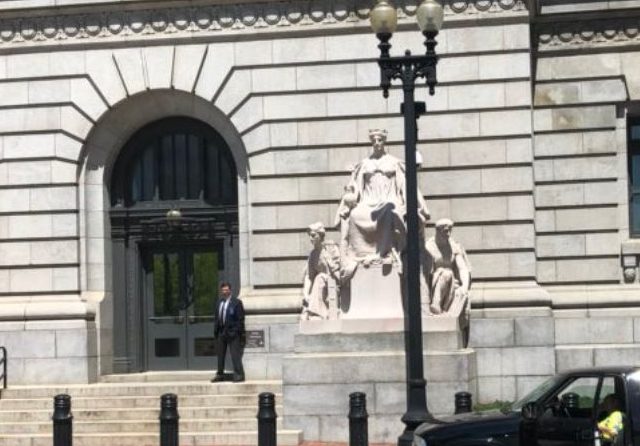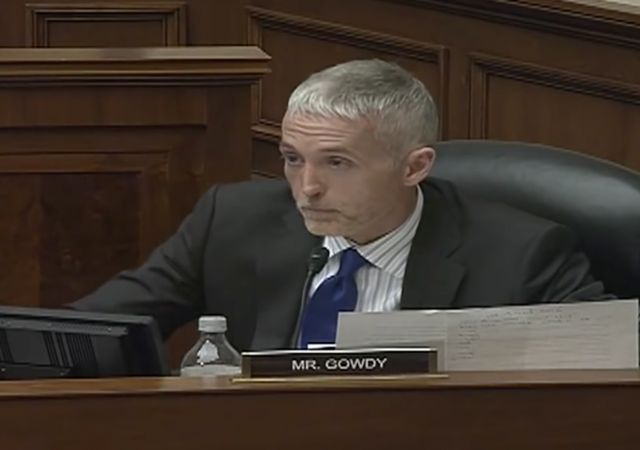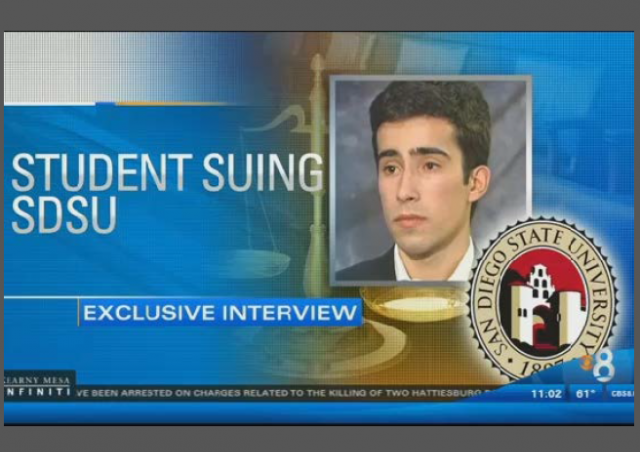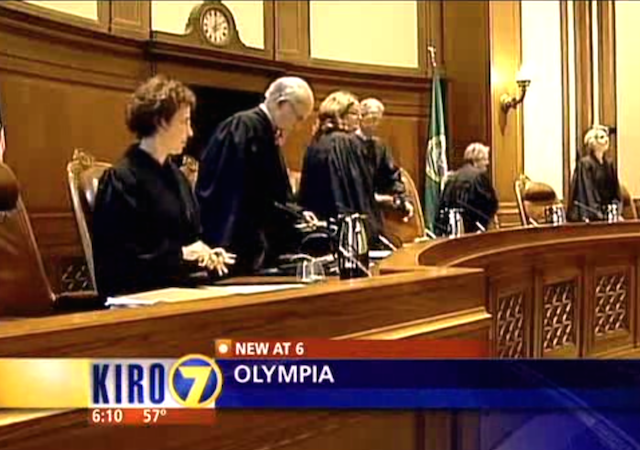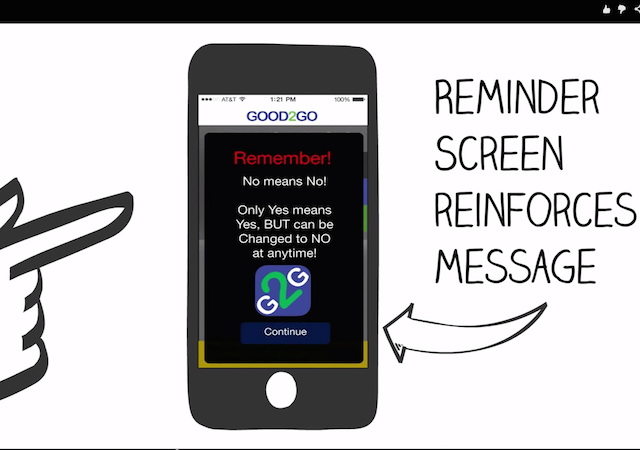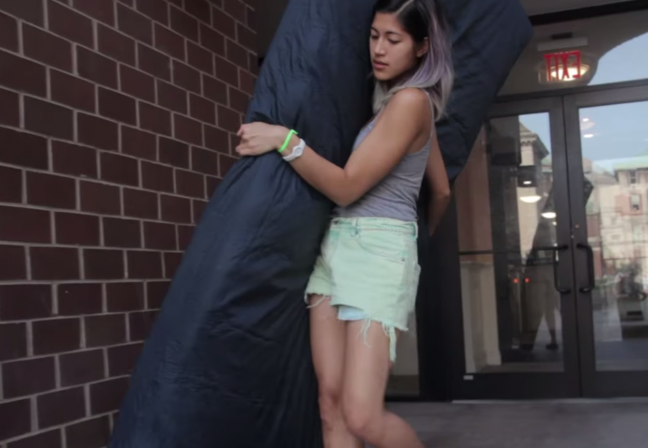Due Process Tag
Kafkaesque campus sexual assault tribunal at Johnson & Wales alleged in lawsuit
Two moments of sanity from California Gov. Jerry Brown
Cornell’s kangaroo court for accused men
Trey Gowdy Grills DHS Official on Due Process
College Sex Contracts – Life Imitates Parody
- California outlaws drunk, sloppy, reckless consensual campus sex
- Video Guide to new California Affirmative Consent Law
- Affirmative Sexual Consent? There’s an app for that.
- Rape Culture Theory Ensnares Innocent Men
- “Rape Culture” Justice: Better 10 Innocent Men Suffer, Than 1 Guilty Man Escape
- Kangaroo courts for men on campus
Accused on campus: Charges dropped, but the infamy remains
A day after being arrested on suspicion of a sexual assault near campus, an SDSU student is out on bail. CBS News 8 cameras were there when 20-year-old Francisco Paiva Sousa was released from jail Wednesday. He was taken into custody Tuesday in connection with the alleged assault Sunday. Sousa said nothing as our cameras caught up with him after he made bail. The SDSU sophomore is accused of forcing a female student to perform oral sex while at a party off campus, according to campus police. Detectives say it happened at a duplex on College Avenue sometime Saturday night or Sunday morning....
Male on leave of absence contests discipline for off-campus conduct with former student
32. On June 14, 2014, John Doe and Jane Doe, along with a group of friends, traveled to Jane Doe’s parents’ home in Lake Tahoe for the weekend to celebrate the end of the school-year. Although some of the individuals on the trip happened to be members of the UCSB Mock Trial Team, the trip was in no way sponsored by or affiliated with UCSB. * * * 37. While John Doe was out of the house, L.B. approached Jane Doe in the master bedroom and asked whether she would be interested in having group sex with her and B.R. Subsequently, Jane Doe, L.B. and D.J. advised B.R. that they would be interested in the group sex only if John Doe was also involved. 38. When John Doe returned to the house, Witness B.R. advised him of B.R.’s earlier conversation with Jane Doe, D.J. and L.B. and inquired whether John Doe would be interested in taking part in the group sex.
Campus “consent” wars: Expelled male student sues Cornell Univ.
Was found "responsible" by campus tribunal for sexual relations he says were consensual....
Washington Supreme Court Gets It Right on Due Process
The court in its 6-3 ruling reversed earlier decisions that forced an alleged rapist to establish a preponderance of evidence that a victim consented to sex. The court said such a burden violated constitutionally protected rights and also wrongly interpreted precedent set by the U.S. Supreme Court. "When a defense necessarily negates an element of the crime charged, the State may not shift the burden of proving that defense onto the defendant," the ruling said. "Requiring a defendant to do more than raise a reasonable doubt is inconsistent with due process principles," Justice Debra Stephens wrote, adding that doing so raises "a very real possibility of wrongful convictions."The media has predictably framed this ruling as one that "could make it more difficult for rape victims to get justice":
"There's another person whose rights need to be taken into consideration, and that's the victim." Six of the nine justices agreed to reduce the rape defendant's burden, saying that 25 years of earlier rulings were incorrect and harmful to the constitutional presumption of innocence. "The prosecutors are going to have to spend much more time describing to the jury and presenting evidence to the jury regarding how the victim responded to those threats, what their body language is, what kind of noises they made, how quickly did they capitulate to the demand that they say that they wanted it." When we talked with YWCA sex assault victim advocate Emily Cordo, she was fearful of the ruling's impact, because now prosecutors will have to prove forcible rape victims did not consent. "Victims have to worry about whether they're going to be treated with respect, and whether they're going to be believed." The three justices in the minority agreed, writing that the majority ruling retreats "to the archaic focus on a rape victim's actions."
FIRE shreds Ezra Klein and denial of due process to college men
Affirmative Sexual Consent? There’s an app for that.
“Good2Go should be treated in the same manner as putting on a condom,” its website explains. “It may stop the action for a second, but everyone understands it is in the interest of safety, so it is worth the momentary pause.” The free app works as follows: After sparks fly with a potential hookup, one of the people involved launches the free Good2Go app on his or her phone. When it is opened, the app will display the question, “Are we Good2Go?” The other party then selects “No thanks,” “Yes, but...we need to talk” or “I’m Good2Go.” If the first option is chosen, a screen pops up that says “Remember! No means No! Only Yes means Yes, BUT can be changed to NO at any time!” The second choice pauses the app so the pair can have their discussion.
California outlaws drunk, sloppy, reckless consensual campus sex
[Bill author Sen. Kevin] De Leon has said the legislation will begin a paradigm shift in how college campuses in California prevent and investigate sexual assaults. Rather than using the refrain "no means no," the definition of consent under the bill requires "an affirmative, conscious and voluntary agreement to engage in sexual activity." "With one in five women on college campuses experiencing sexual assault, it is high time the conversation regarding sexual assault be shifted to one of prevention, justice, and healing," de Leon said in lobbying Brown for his signature. The legislation says silence or lack of resistance does not constitute consent. Under the bill, someone who is drunk, drugged, unconscious or asleep cannot grant consent.The bill holds hostage funding for colleges and universities unless "the governing board of each community college district, the Trustees of the California State University, the Regents of the University of California, and the governing boards of independent postsecondary institutions shall adopt a policy concerning sexual assault, domestic violence, dating violence, and stalking..." That policy is strictly defined within the bill, and mandates new, uniform procedures for the reporting, counseling, and investigation of alleged sexual misconduct on campus.
UPDATED: Columbia student carries mattress around campus after rape claims denied
As long as her alleged rapist goes to Columbia, Emma Sulkowicz, CC ’15, plans on carrying a navy blue, extra-long twin-sized mattress wherever she goes.
Entitled “Carry That Weight,” the mattress is both the visual art major’s senior thesis and a step in her journey to come to terms with her experience. Over the past year, Sulkowicz has become a prominent critic of the University’s sexual assault adjudication policies, retelling her story to various administrators and media organizations to raise awareness.
“The past year of my life has been really marked by telling people what happened in that most intimate and private space,” Sulkowicz said, referring to the dorm bed where she was allegedly raped on the second night of her sophomore year.
“I was raped in my own dorm bed and since then, that space has become fraught for me. I feel like I’ve carried the weight of what happened there since then,” she added.
Months after her alleged rape, Emma reported the incident to the school. Her case, one of three individual complaints filed against the same student, was closed, and her rapist found “not responsible.” She appealed, but it was denied and the decision was upheld.
Sulkowicz has turned what she says was a horrible tragedy into performance art.
Performance art that will suffice as her senior thesis. A fact I'll just leave there without commenting on further:
Sulkowicz plead her case to the university. But why didn't she go to the police?- 1
- of 2
Donations tax deductible
to the full extent allowed by law.
CONTRIBUTORS
- William A. Jacobson
Founder
- Kemberlee Kaye
Sr. Contrib Editor
- Mary Chastain
Contrib Editor
- Mike LaChance
Higher Ed
- Leslie Eastman
Author
- Vijeta Uniyal
Author
- Stacey Matthews
Author
- Jane Coleman
Author
- Ben Smith
Weekend Editor
- Elizabeth Stauffer
Author
- Mandy Nagy
Editor Emerita
- Learn more about the Contributors


